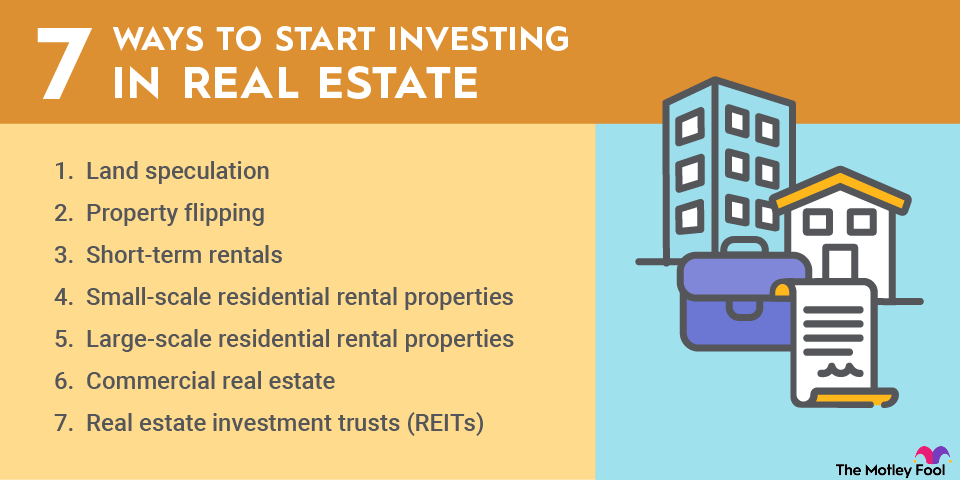Are you intrigued by the idea of growing your wealth through real estate investment but unsure where to start? Imagine waking up to the prospect of financial freedom, knowing that your money is working for you.
Real estate can be the key to unlocking this dream, even if you’re a complete beginner. You’re about to discover a world where your savings can multiply, offering you both security and prosperity. With the right guidance, you can navigate this exciting venture with confidence.
Stay with us as we unravel the basics, bust myths, and reveal strategies tailored just for you. Your journey to becoming a savvy real estate investor starts right here, right now.
What Is Real Estate Investment?
Real estate investment means buying propertiesto make money. People can buy houses or buildings. They hope the value will grow over time. Some investors rent out their properties. They earn money from rent payments. This is called passive income.
Real estate can be a safe investment. It is a physical asset. Unlike stocks, it doesn’t disappear overnight. But it requires good research. Knowing the market is very important. Buying in the right place helps. It increases chances of profit.
Beginners should start small. Learn about the types of real estate. There are different options. Each has its own benefits and risks. Understanding these helps in making wise decisions.

Benefits Of Real Estate Investment
Real estate investment offers a stable income source. Properties appreciate over time, increasing their value. Rental income provides monthly cash flow. Tax benefits are available to property owners. They can reduce taxable income. Real estate is a tangible asset. You can see and touch it. Unlike stocks, it’s less volatile. Property values don’t change quickly. You can diversify your investment portfolio. It reduces risk. Selling properties can generate large profits. Long-term investment in real estate builds wealth. Owning a property creates equity. It’s the difference between property value and owed money. Real estate is a safe investment option. It withstands economic changes. Investing in real estate offers financial security.
Types Of Real Estate Investments
Residential properties include houses and apartments. They are for people to live in. These properties can be bought or rented. Owning a home can be a great start for beginners. It helps in learning about real estate. Some people buy homes to rent out. This can bring in money every month. Renting out a property is also a common choice. It gives a steady income.
Commercial properties are different. They include offices and shops. These places are for business use. Buying a shop can be a good investment. People often rent these spaces for their businesses. Leasing commercial spaces can be profitable. Businesses pay rent for using these spaces. This can be a stable source of income.
REITs are special. They let you invest in real estate without buying property. REITs own many properties. They include malls, hospitals, and offices. Buying shares in REITs is like buying a small part of these properties. Investors earn from the profits made by REITs. It is a way to earn without managing properties.
Rental properties are popular. Owners rent them to others. Tenants pay rent every month. This provides a steady income. Rental homes can be houses or apartments. They are a good choice for beginners. Managing rentals needs some work. But it can bring good returns over time.
Key Considerations Before Investing
Understanding the real estate market is very important. Study the current trends. Look at the property prices. Are they going up or down? Check the demand and supply in the area. Is there a high demand for homes? This helps you make a smart choice.
Check your budget before buying a property. Know the costs involved. This includes the purchase price, taxes, and maintenance. Can you afford it? Calculate your potential returns. Will you make a profit? Be sure to plan your finances well.
A good location is key to a good investment. Look for areas with growth potential. Are there schools, shops, and parks nearby? These make a place more attractive. Check the neighborhood safety. Is it a safe place to live? Good locations often mean better returns.
Getting Started With Real Estate Investment
Clear goals help in real estate investment. Decide on the amount you wish to invest. Think about the returns you expect. Short-term goals may focus on quick profits. Long-term goals often involve steady income. Goals guide your choices. Stick to them.
A diverse portfolio is key. Mix residential and commercial properties. Consider location as it affects value. Rental properties can provide monthly income. Flipping houses might bring quick gains. Balance risk with rewards. Keep learning.
Look for opportunities everywhere. Real estate websites list many options. Auctions might offer good deals. Talk to local agents for insights. Network with other investors. Stay informed about market trends. Be ready to act fast.
Financing Your Investment
Starting in real estate investment can be exciting for beginners. Explore options like savings, loans, or partnerships to finance your journey. Understanding these choices helps build a solid foundation for future success.
Mortgage Options
Mortgages help buy homes without full payment upfront. Many banks offer fixed-rate mortgages. These have the same rate over time. Adjustable-rate mortgages can change rates. They start low but can rise. Government-backed loans like FHA are good for first-time buyers. They have lower down payments.
Private Lending
Private lending is borrowing from people, not banks. Friends or family can be lenders. Private lenders may have flexible terms. Interest rates might be higher. Private loans need trust and clear agreements. This can be a fast way to get funds.
Crowdfunding
Crowdfunding gathers small amounts from many people. Platforms like Fundrise help this process. Each person invests a small amount. Investors share profits later. This is a new way to invest in real estate. It’s easy to start with little money.
Managing Your Real Estate Investment
Starting your real estate investment journey involves understanding market trends and property management basics. Learning these fundamentals helps beginners make informed decisions and manage investments effectively. Focus on building a strategy that aligns with financial goals and risk tolerance.
Property Management Basics
A good property manager can be a lifesaver. They handle rent collection and tenant problems. They also ensure your property stays in good shape. Hire someone with experience. Make sure they have a good track record. This will save you time and stress.
Tenant Relations
Treat tenants with respect. Happy tenants stay longer and pay on time. Listen to their concerns and respond quickly. Keep communication open. Clear agreements avoid many problems. This helps create a positive living environment.
Maintenance And Upkeep
Regular maintenance saves money. Fix small issues before they become big ones. Check your property often. Keep it clean and safe. Hire trusted workers for repairs. This keeps your investment in great condition.

Common Mistakes To Avoid
Many beginners overlook the importance of research. Not knowing the market can lead to bad investments. Always check property values. See if the area is growing. Rushing into deals is another mistake. Take your time. Understand the contract terms.
Ignoring hidden costs can be costly. Maintenance and taxes add up. Budget for these expenses. Many people forget about property management. It can take time and effort. Consider hiring a manager if needed.
Emotional buying leads to poor choices. Make decisions based on facts, not feelings. Always have a backup plan. Markets can change. Be ready to adapt. Stay informed and make wise choices.
Future Trends In Real Estate Investment
Real estate is always changing. Technology is making things faster. Virtual tours help buyers see homes online. Smart homes are growing. They use apps to control lights and temperature. Sustainable buildings are popular. They save energy and water.
Cities are getting bigger. People move for jobs and schools. Urban areas need more homes. Rural lands are also in demand. People want space to relax. Rental properties are a good idea. They provide steady income.
Investing in real estate is exciting. Research trends before buying. Look at local markets and prices. Understand what people need in homes. Stay updated with news. Smart choices can lead to success.
:max_bytes(150000):strip_icc()/most-important-factors-investing-real-estate.asp-ADD-FINALjpg-32950329a30d4500b6d7e0fd0ba95189.jpg)
Frequently Asked Questions
What Is Real Estate Investment?
Real estate investment involves purchasing property to earn a return through rental income or future resale. It can include residential, commercial, or land properties. Beginners should research thoroughly and consider location, market trends, and financing options to make informed decisions.
Understanding these basics helps in making successful investments.
How Do I Start In Real Estate?
To start in real estate, educate yourself on property types and market trends. Set clear investment goals and budget. Consider working with a real estate agent or mentor. Begin with small investments to gain experience. Networking and continuous learning are key to long-term success in real estate.
Is Real Estate Investment Profitable?
Real estate investment can be profitable if approached strategically. It offers rental income, tax benefits, and potential appreciation. Market research and careful planning are essential. Understanding local market dynamics and choosing properties wisely contribute to profitability. However, risks like market fluctuations should be considered.
What Are The Risks In Real Estate?
Real estate investment carries risks such as market downturns, property depreciation, and unexpected expenses. Poor location choices can affect property value. Economic changes and interest rate fluctuations impact returns. Mitigate risks through research, diversification, and maintenance. Understanding these risks helps in making informed investment decisions.
Conclusion
Starting real estate investment can feel overwhelming. Yet, it’s a rewarding journey. Educate yourself. Research properties thoroughly. Connect with experienced investors. These steps build a strong foundation. Understand market trends. They impact investment decisions. Practice patience; success takes time. Start small; grow gradually.
Every step counts in learning. Keep an eye on risks and opportunities. This helps make informed choices. Remember, persistence is key. Your efforts will pay off. Stay committed to your goals. With dedication, you can succeed in real estate. Explore, learn, and invest wisely.
